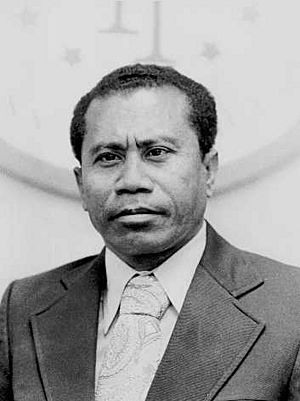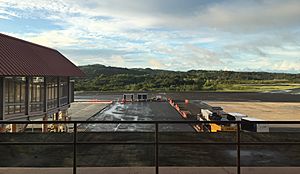Roman Tmetuchl facts for kids
Quick facts for kids
Roman Tmetuchl
|
|
|---|---|
 |
|
| Born | February 11, 1926 Babelthuap, Airai, Palau
|
| Died | July 1, 1999 (aged 73) |
| Occupation | Businessman, politician |
| Years active | 1970–1990 |
| Spouse(s) | Dirrengerkiu Perpetua "Tua" Polloi Tmetuchl |
| Administrative Assistant to the Chief Justice of the Trust Territory High Court | |
| In office 1952–1957 |
|
Roman Tmetuchl (born February 11, 1926 – died July 1, 1999) was an important political leader and businessman from Palau. He grew up when Palau was controlled by Japan. During World War II, he worked for the Japanese military police.
After the war, he became a leader of Palau's Liberal Party. He served in the Congress of the Trust Territory of the Pacific Islands from 1964 to 1978. He strongly believed that Palau should be separate from the rest of Micronesia. He also became the governor of Airai.
As a businessman, Tmetuchl led many building projects. These included the Palau International Airport, which was later named after him. He also helped build a clinic for the Seventh-day Adventist Church.
Contents
Early Life and Education
Roman Tmetuchl was born in 1926 in the Eloklsumech clan of Airai. He spent his childhood in Koror while Palau was under Japanese rule. He went to a Japanese elementary school in Koror and was very good at math. During this time, he also worked as a janitor and delivered newspapers.
Tmetuchl was a talented athlete. He was known as a fast sprinter and jumper. Later in his life, he coached sports teams. He also helped Palauan athletes compete in the 1969 Micronesian Games.
In 1943, he started working for the Kempeitai, which was Japan's military police during World War II. He began with cleaning jobs. He then worked for a high-ranking officer. He learned about the war's progress at the police headquarters.
After the war, he returned to Koror. He started working for the U.S. military at a quarry. Tmetuchl already spoke Palauan and Japanese. He then began learning English.
He joined a group for teacher training. This helped him learn even more English. In 1948, he traveled to Guam for more education. He also gave a statement at a trial for Japanese soldiers. At age 23, he entered the 11th grade at George Washington High School in Guam. He graduated in 1951 as one of the top students.
Political Journey
Early Steps in Politics
Roman Tmetuchl was a key leader of Palau's Liberal Party. He remained a leader throughout his political career. In 1950, he led a workers' strike in Palau. The goal was to get higher wages for workers.
Throughout the 1950s and early 1960s, he held various roles. He worked as a translator and a public defender. He also served as a counselor and a district court judge. From 1954 to 1955, he studied law in the Philippines. He received a scholarship from the United Nations for this study.
On April 9, 1956, he became president of Palau's local legislature. This body was called Olbiil era Kelulau era Belau. He took over from his brother, Toribiong Uchel. For eight years, from 1954 to 1962, he worked to get Ngerekebesang Island back. The Trust Territory of the Pacific Islands had taken it from the Japanese government.
Working in the Congress of Micronesia
In 1965, Roman Tmetuchl was elected to the First Congress of Micronesia. This was for the Trust Territory of the Pacific Islands. He ran for re-election in 1966 but lost his senate seat. In 1968, he won a congressional seat through a public vote.
From 1969 to 1970, he served on committees. These groups planned for the future political status and budget. On July 28, 1969, he proposed a resolution. It called for Micronesia to become independent within seven years. This idea was sent to another committee, but no further action was taken.
In 1970, he ran for a senate seat against John O. Ngiraked. Tmetuchl won the public vote. There was an incident where a man tried to harm Roman. However, Tmetuchl decided not to press charges. After some review, the election results were accepted. Tmetuchl officially became a senator on January 29, 1971. His main goal as senator was to gain independence for Micronesia. He also pushed for war claims. These claims were for the damage Palau suffered during World War II.
In 1974, Tmetuchl led Palau's new Select Committee on Development. He supported a bill that would let Palauans write their own constitution. He wanted Palau to have a loose connection with other Micronesian islands. He also wanted separate talks with the United States. To achieve this, he formed a group in Palau's legislature that wanted separation.
He first supported full independence for Palau. Later, he changed his mind. He then supported a status similar to the Commonwealth of the Northern Mariana Islands. A newspaper in Palau, Tia Belau, criticized his new view in 1975. They said it did not match what most people in Palau thought.
Around 1974, rumors spread about building a large port in Palau. Environmental groups were against this idea. They thought that supporting separate status would stop the port project. In March 1976, Tmetuchl traveled to Iran. He met with officials to discuss securing the port project. However, by November 1976, Tmetuchl decided to reject the superport idea.
From 1976 to 1978, Tmetuchl worked with several American advisors. These advisors helped him with legal and political matters. Tmetuchl and the Palau Political Status Commission (PPSC) went to the United Nations Trusteeship Council in July 1976. They then went to Washington, D.C., to discuss Palau's separate status. Some groups wanted Palau to unite with other Micronesian districts. They asked the government to remove Tmetuchl from his senate seat. On February 25, 1978, the Congress of Micronesia voted to remove Tmetuchl from his position.
In April 1978, he signed an agreement in Hilo, Hawaii. This agreement outlined principles for a "Free Association." Palau's House of Chiefs said Tmetuchl had acted beyond his authority. However, Tmetuchl stated that most Palauans agreed with his actions. A later vote showed that 88% of the island's voters wanted separate status.
Presidential Campaigns
Tmetuchl ran for president of Palau in 1980. He lost to Remeliik. After this, Tmetuchl stopped supporting the Compact of Free Association. He used his power in the senate to oppose Remeliik's government. In January 1981, he became governor of Airai. He helped negotiate during three workers' strikes against Remeliik's administration.
Tmetuchl ran for president again in 1984. He ran against the current president, Remeliik, and Ibedul Gibbons. He lost to Remeliik again. Remeliik was murdered in 1985. This event made it difficult for Tmetuchl to run for president in August 1985.
He ran for president one more time in the 1988 Palauan general election. In this election, the person with the most votes won. Tmetuchl received 26% of the votes. This was only 31 votes fewer than the winner, Ngiratkel Etpison. This very close result led to changes in Palauan elections. Now, if no candidate gets more than half the votes, there is a second round. After this defeat, Tmetuchl decided to focus on his businesses and family.
Business Ventures
Roman Tmetuchl owned many businesses throughout his life. These included real estate, restaurants, a travel agency, and a hardware store. In the 1950s, Tmetuchl traveled to the United States. During his trip, he learned how to make hollow concrete blocks. These blocks were cheap to make. He brought this skill back to Palau. He used concrete from old Japanese buildings to make new blocks.
With help from his uncle's saw mill, he built several houses using these concrete blocks. In 1952, he started his own construction company. He bought land in Koror and Babeldaob.
Tmetuchl and his team helped William Vitarelli build schools in Palau. They raised money for the project. They also asked the Trust Territory of the Pacific Islands for a building contract. Someone accused Tmetuchl of not paying the workers enough. However, courts found that the workers were actually paid more than required. The village of Ngchesar apologized for the misunderstanding. Tmetuchl then hosted a party for the workers.
In 1966, the high chief Ibedul Ngoriakl asked Tmetuchl to expand an office building. This building was near the TTPI District Administration office. While it was being built, Typhoon Sally damaged the structure in March 1967. The chief moved his office construction to a new site. He allowed Tmetuchl to keep the damaged building. Tmetuchl repaired and expanded this building. It became known as the Pacifica Development Corporation Group building. This building grew into one of Palau's most important centers for business and politics.
In the late 1970s, Tmetuchl bought a rock quarry on Malakal island. He also helped fund the construction of the Seventh-day Adventist High School during this time. In 1983, Tmetuchl met businessman Masao Nishizono in Japan. They became partners to build an airport terminal and a hotel in Airai. Construction on these projects stopped in June 1984. Lawsuits delayed the opening of the Grace Hotel. The hotel finally opened in July 2000. In 1984, he built a private power plant in Airai. It had two electric generators. He updated it after South Korean engineers checked it in 1996.
On March 4, 1985, Tmetuchl opened Palau's first local bank in Koror. While serving as governor of Airai in the 1980s, he led projects to create a clan house. He also built four modern bais, which are men's meetinghouses. In 1986, he built twelve houses in an Airai village. He used Chinese workers for this project. He designed and built Airai State Elementary School. He opened and dedicated the school on March 6, 1989.
Tmetuchl was inspired by a clinic in Guam. He funded the creation of a similar clinic in Palau. This clinic was located in the Ngerbeched area of Koror. It opened on May 26, 1991. In 1997, he led a project to build a Sabbath School building. This building was next to the Seventh-day Adventist Church. His wealth that year was estimated to be over $30 million. The next year, he gave land and money for a new Seventh-day Adventist Church in Ngchesar. He passed away in 1999 while the church was still being built.
Death and Lasting Impact
Roman Tmetuchl began feeling unwell in January 1999. His health slowly worsened over the next few months. He died on July 1, 1999, from pancreatic cancer. He was a member of the Seventh-day Adventist Church and read his Bible daily. The President of Palau, Kuniwo Nakamura, declared a period of national mourning for Tmetuchl.
On April 11, 2006, several Palauan senators proposed renaming Palau International Airport. They suggested calling it the Roman Tmetuchl International Airport. The senate approved this idea on May 4, 2006. They stated that the new name was fitting because of Tmetuchl's many years of valuable service to Palau. They also noted his help in developing the airport. In 2008, the Tmetuchl family built a chapel at Belau National Hospital. This was done to honor Roman and continue his legacy.
See also
In Spanish: Roman Tmetuchl para niños
 | Chris Smalls |
 | Fred Hampton |
 | Ralph Abernathy |


